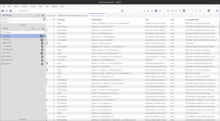JabRef is an open-source, cross-platform citation and reference management software.[3][4] It is used to collect, organize and search bibliographic information.
 JabRef 5.9 under Linux | |
| Original author(s) | Morten O. Alver, Nizar N. Batada, et al. |
|---|---|
| Developer(s) | The JabRef team[1] |
| Initial release | 29 November 2003 |
| Stable release | 5.15[2] |
| Repository | |
| Written in | Java |
| Operating system | Windows, macOS, Linux |
| Size | 180 MB |
| Available in | 23 languages |
List of languages Brazilian Portuguese, Chinese (simplified), Chinese (classical), Danish, Dutch, English, Farsi, French, German, Greek, Indonesian, Italian, Japanese, Korean, Norwegian, Polish, Portuguese, Russian, Spanish, Swedish, Tagalog, Turkish, Vietnamese | |
| Type | Reference management |
| License | MIT License |
| Website | www |
JabRef has a target audience of academics and many university libraries have written guides on its usage.[5][6][7] It uses BibTeX and BibLaTeX as its native formats and is therefore typically used for LaTeX.[8] The name JabRef stands for Java, Alver, Batada, Reference. The original version was released on November 29, 2003.[9]
Features
editJabRef supports Windows, Linux and Mac OS X, it is available free of charge and is actively developed.
Collection
edit- Import options for over 15 reference formats.
- Extraction of metadata from PDFs.
- Retrieval of articles and bibliographic information based on identifiers (arXiv, Biodiversity Heritage Library, CrossRef, DiVA, DOI, IACR eprints, ISBN, Library of Congress, MathSciNet, mEDRA, PubMed, RFC, SAO/NASA ADS, and zbMATH).
- Support for the online scientific catalogues of ACM Portal, arXiv, CiteSeer, Collection of Computer Science Bibliographies, CrossRef, DBLP, DOAJ, GVK, IEEEXplore, INSPIRE-HEP, MathSciNet, Medline, SAO/NASA Astrophysics Data System, Springer, and zbMATH.
- Browser based reference importing with the JabFox add-on for Chrome, Edge, Firefox and Vivaldi.
Organization
edit- Supports hierarchical groupings based on keywords, tags, search terms etc.
- Includes features for searching, filtering and detecting duplicates.
- Attempts to complete partial bibliographic data by comparing with curated online catalogues such as Google Scholar, Springer or MathSciNet.
- Citation keys, metadata fields and file renaming rules are customizable.
Interoperability
edit- Thousands of citation styles are built-in.
- Cite-as-you-write functionality for external applications such as Emacs, Kile, LyX, Texmaker, TeXstudio, Vim and WinEdt.
- Support for Word and LibreOffice/OpenOffice for inserting and formatting citations.
- Library is saved as a human readable text file.
- When editing in a group, the library can be synchronized with a SQL database.
Installation
editThe latest stable release is available at FossHub. For Unix-like operating systems, it is also common for JabRef to be available through the default package manager. Moreover, fresh development builds are available at builds.jabref.org.
See also
editReferences
edit- ^ maintainers file in JabRef repository
- ^ "Release 5.15". 10 July 2024. Retrieved 23 July 2024.
- ^ "The relationship of code churn and architectural violations in the open source software JabRef | Proceedings of the 11th European Conference on Software Architecture: Companion Proceedings". 2017: 152–158. doi:10.1145/3129790.3129810. S2CID 32372358.
{{cite journal}}: Cite journal requires|journal=(help) - ^ Basak, Sujit Kumar (2014). "Reference Management Software: A Comparative Analysis of JabRef and RefWorks" (PDF). Int'l Conf. On Chemical Engineering & Advanced Computational Technologies.
- ^ "BibTex and LaTex: JabRef". Library of University of Saskatchewan. Retrieved 2019-06-06.
- ^ "JabRef and LateX". The Library of the Melbourne University. Archived from the original on 2021-10-06. Retrieved 2019-06-06.
- ^ Feyer, S.; Siebert, S.; Gipp, B.; Aizawa, A.; Beel, J. (2017). "Integration of the Scientific Recommender System Mr. DLib into the Reference Manager JabRef". In Jose, Joemon M; Hauff, Claudia; Altıngovde, Ismail Sengor; Song, Dawei; Albakour, Dyaa; Watt, Stuart; Tait, John (eds.). Advances in Information Retrieval. Lecture Notes in Computer Science. Vol. 10193. Cham: Springer International Publishing. pp. 770–774. doi:10.1007/978-3-319-56608-5_80. ISBN 978-3-319-56608-5.
- ^ Beel, Joeran (2013-11-11). "On the popularity of reference managers, and their rise and fall | | Prof. Joeran Beel (TCD Dublin)". Archived from the original on 2020-06-27. Retrieved 2020-03-11.
- ^ "History of JabRef". Retrieved 2011-12-30.